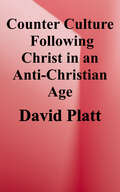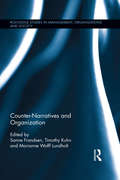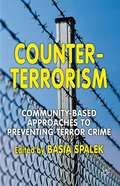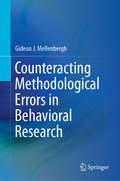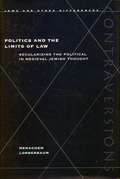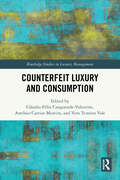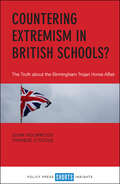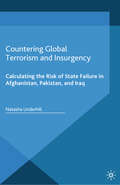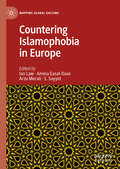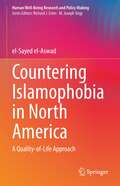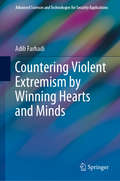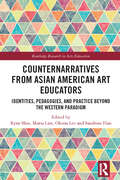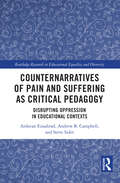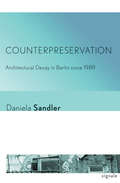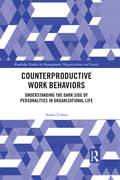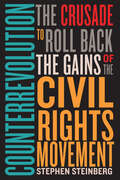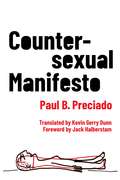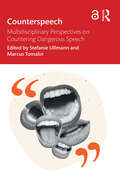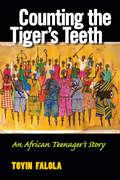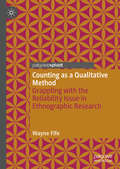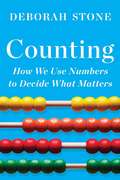- Table View
- List View
Counted Out: Same-sex Relations and Americans' Definitions of Family
by Brian PowellThis book is about family--in particular, which living arrangements are counted in Americans' definitions of family, and which ones are counted out. In thinking about the support, advice, and assistance we received while completing this book, we recognize that a great number of people and organizations must be counted in.
Counter Culture: Following Christ in an Anti-Christian Age
by David PlattWelcome to the front lines. Everywhere we turn, battle lines are being drawn--traditional marriage vs. gay marriage, pro-life vs. pro-choice, personal freedom vs. governmental protection. Seemingly overnight, culture has shifted to the point where right and wrong are no longer measured by universal truth but by popular opinion. And as difficult conversations about homosexuality, abortion, and religious liberty continue to inject themselves into our workplaces, our churches, our schools, and our homes, Christians everywhere are asking the same question: How are we supposed to respond to all this? <p><p>In Counter Culture, New York Times bestselling author David Platt shows Christians how to actively take a stand on such issues as poverty, sex trafficking, marriage, abortion, racism, and religious liberty--and challenges us to become passionate, unwavering voices for Christ. Drawing on compelling personal accounts from around the world, Platt presents an unapologetic yet winsome call for Christians to faithfully follow Christ into the cultural battlefield in ways that will prove both costly and rewarding. The lines have been drawn. The moment has come for Christians to rise up and deliver a gospel message that's more radical than even the most controversial issues of our day.
Counter-Narratives and Organization (Routledge Studies in Management, Organizations and Society #39)
by Timothy Kuhn Sanne Frandsen Marianne Wolff LundholtCounter-Narratives and Organization brings the concept of "counter-narrative" into an organizational context, illuminating these complex elements of communication as intrinsic yet largely unexplored aspect of organizational storytelling. Departing from dialogical, emergent and processual perspectives on "organization," the individual chapters focus on the character of counter-narratives, along with their performative aspects, by addressing questions such as: how do some narratives gain dominance over others? how do narratives intersect, relate and reinforce each other how are organizational members and external stakeholders engaged in the telling and re-telling of the organization? The empirical case studies provide much needed insights on the function of counter-narratives for individuals, professionals and organizations in navigating, challenging, negotiating and replacing established dominant narratives about "who we are," "what we believe," "what we do" as a collective. The book has an interdisciplinary scope, drawing together ideas from both storytelling in organization studies, the communicative constitution of organization (CCO) from organizational communication, and traditional narratology from humanities. Counter-Narratives and Organization reflects an ambition to spark readers’ imagination, recognition, and discussion of organization and counter-narratives, offering a route to bring this important concept to the center of our understandings of organization.
Counter-Terrorism
by Basia SpalekThis book examines community-based approaches to counter-terrorism through an analysis of the notions of community, partnership, engagement, gender and religion in order to shed new light on the potential of, and drawbacks to these approaches. Dr. Spalek stresses the need for policy makers and practitioners to reflect on the effectiveness of the initiatives that they are engaged with, particularly in relation to how community-targeted or community-focused they are.
Counteracting Methodological Errors in Behavioral Research
by Gideon J. MellenberghThis book describes methods to prevent avoidable errors and to correct unavoidable ones within the behavioral sciences. A distinguishing feature of this work is that it is accessible to students and researchers of substantive fields of the behavioral sciences and related fields (e.g., health sciences and social sciences). Discussed are methods for errors that come from human and other factors, and methods for errors within each of the aspects of empirical studies. This book focuses on how empirical research is threatened by different types of error, and how the behavioral sciences in particular are vulnerable due to the study of human behavior and human participation in studies. Methods to counteract errors are discussed in depth including how they can be applied in all aspects of empirical studies: sampling of participants, design and implementation of the study, instrumentation and operationalization of theoretical variables, analysis of the data, and reporting of the study results. Students and researchers of methodology, psychology, education, and statistics will find this book to be particularly valuable. Methodologists can use the book to advice clients on methodological issues of substantive research.
Counterculture Colophon: Grove Press, the Evergreen Review, and the Incorporation of the Avant-Garde
by Loren GlassResponsible for such landmark publications asLady Chatterley's Lover,Tropic of Cancer,Naked Lunch, Waiting for Godot,The Wretched of the Earth, andThe Autobiography of Malcolm X, Grove Press was the most innovative publisher of the postwar era. Counterculture Colophontells the story of how the press and its house journal,The Evergreen Review, revolutionized the publishing industry and radicalized the reading habits of the "paperback generation. " In the process, it offers a new window onto the 1960s, from 1951, when Barney Rosset purchased the fledgling press for $3,000, to 1970, when the multimedia corporation into which he had built the company was crippled by a strike and feminist takeover. Grove Press was not only responsible for ending censorship of the printed word in the United States but also for bringing avant-garde literature, especially drama, into the cultural mainstream as part of the quality paperback revolution. Much of this happened thanks to Rosset, whose charismatic leadership was crucial to Grove's success. With chapters covering world literature and the Latin American boom, including Grove's close association with UNESCO and the rise of cultural diplomacy; experimental drama such as the theater of the absurd, the Living Theater, and the political epics of Bertolt Brecht; pornography and obscenity, including the landmark publication of the complete work of the Marquis de Sade; revolutionary writing, featuring Rosset's daring pursuit of the Bolivian journals of Che Guevara; and underground film, including the innovative development of the pocket filmscript, Loren Glass covers the full spectrum of Grove's remarkable achievement as a communications center of the counterculture.
Counterfeit Luxury and Consumption (Routledge Studies in Luxury Management)
by António Carrizo Moreira Cláudio Félix Canguende-Valentim Vera Teixeira ValeCounterfeiting is a widespread problem in the luxury market. To develop appropriate countermeasures, a comprehensive understanding of this phenomenon is crucial. This book provides a holistic approach to explore counterfeit luxury consumption.This edited volume seeks to identify new trends by examining three levels of analysis. First, it explores the macro level related to the brand, including corporate decisions and marketing strategies. Second, the meso level focuses on the influence of interpersonal and sociocultural contexts. Thirdly, the micro level examines intrapersonal and situational contingencies. With contributions from international experts, the book provides broad perspectives from both the demand and supply side of luxury counterfeiting, offering valuable insights to help mitigate the issue and improve counter strategies.Counterfeit Luxury and Consumption will be of interest to researchers, postgraduate students, and policymakers across the fields of luxury management, marketing, consumer behavior, brand management, and ethical and responsible business.
Countering Extremism in British Schools?: The Truth about the Birmingham Trojan Horse Affair
by John Holmwood Therese O'TooleIn 2014 an investigation into an alleged plot to ‘Islamify’ several state schools in Birmingham began. Known as the ‘Trojan Horse’ affair, this caused a previously highly successful school to be vilified. Holmwood, an expert witness in the professional misconduct cases brought against the teachers, and O’Toole, who researches the government’s counter-extremism agenda, challenge the accepted narrative and draw on the potential parallel with the Hillsborough disaster to suggest a similar false narrative has taken hold of public debate. This important book highlights the major injustice inflicted on the teachers and shows how this affair was used to criticise multiculturalism, and justify the expansion of a broad and intrusive counter extremism agenda.
Countering Global Terrorism and Insurgency: Calculating The Risk Of State-failure In Afghanistan, Pakistan And Iraq (New Security Challenges)
by Natasha UnderhillExplores current debates around religious extremism as a means to understand and re-think the connections between terrorism, insurgency and state failure. Using case studies of Pakistan, Afghanistan and Iraq, she develops a better understanding of the underlying causes and conditions necessary for terrorism and insurgency to occur.
Countering Islamophobia in Europe (Mapping Global Racisms)
by Ian Law Amina Easat-Daas Arzu Merali S. SayyidThe treatment of Muslims is the touchstone of contemporary European racism across its many nations and localities. We make a definitive case for two arguments in this book: firstly, the recognition of the accelerating and pervasive nature of Islamophobia in this region; and secondly, recognition that this process is being, can be, and will be challenged by counter-narratives that make the claim for Muslim humanity, plurality, space and justice. This book draws on new evidence from eight national contexts to provide an innovative kit of counter-narratives, which were presented and well received at the European Parliament in September 2018, and subsequently launched across Europe in national workshops in selected states. A synergy between leading academic researchers and the Islamic Human Rights Commission, Countering Islamophobia in Europe will be of value to EU institutions, governments and policy-makers, NGOs and media organisations, as well as researchers of multiculturalism, Islam, Muslims and immigration.
Countering Islamophobia in North America: A Quality-of-Life Approach (Human Well-Being Research and Policy Making)
by el-Sayed el-AswadThis book puts together grounded research on the discourses that counter Islamophobic tropes in North America. Dealing with an important and urgent issue of human rights, it explores how public policies, new conceptualizations, and social movements can transform Islamophobia into a positive and healthy discourse. Surprisingly, and apart from selected media studies, empirical investigations about countering xenophobia and hate are rare. The book proposes effective means and mechanisms to help generate debate, dialogue, and discussion concerning policy issues to mitigate Islamophobia. Written in uncomplicated language, this topical book will attract specialist and non-specialist readers interested in the topic of Islamophobia, understanding the roots of Islamophobic hate rhetoric, and how to counter it.
Countering Violent Extremism by Winning Hearts and Minds (Advanced Sciences and Technologies for Security Applications)
by Adib FarhadiSince 9/11, the United States and its allies have been waging an endless War on Terror to counter violent extremism by “winning hearts and minds,” particularly in Afghanistan. However, violent extremism remains on the rise worldwide.The effort and sacrifice of the War on Terror have been continually undermined by actions, narratives, and policies that many of the 1.8 billion Muslims worldwide perceive as Islamophobic. Incidents of Islamophobia on the part of Western governments, media, and civilians, whether intentional or unintentional, alienate the majority of Muslims who are law-abiding and would be key allies in the fight against violent extremism. In Afghanistan, for example, violent extremist groups portray U.S. and NATO forces as blasphemous, anti-Muslim invaders to frighten Afghan villagers into compliance. A similar perception weakens domestic countering violent extremism programs in the West that rely on cooperation with Muslim communities. As the Great Powers Competition emerges among the U.S., Russia, and China, America and the West can ill afford any further impairment in their counterterrorism strategy. The dangers of Islamophobia must be recognized and eradicated immediately.In Countering Violent Extremism by Winning Hearts and Minds, Adib Farhadi demonstrates how Islamophobia poses a threat to U.S. national security by utilizing historical context, statistical analysis, and in-depth case studies. Farhadi, who headed Afghanistan’s National Development Strategy, describes how Koran burnings, anti-Islamic rhetoric, and racial profiling harm relationships with the majority of Muslims who are not involved in violent extremism and thus perpetuate the War on Terror. America has sacrificed thousands of lives and has spent more than $6 trillion on the War on Terror. It can ill afford to squander more valuable resources in a strategy undermined by Islamophobia or perception of Islamophobia. As Farhadi explains, only through a reconciliatory narrative, can we work toward a shared future where violent extremism is eradicated. This book is essential reading for scholars, policymakers, practitioners, and executives who are invested in maintaining and rebuilding American credibility essential to global security and peace.
Counternarratives from Asian American Art Educators: Identities, Pedagogies, and Practice beyond the Western Paradigm (Routledge Research in Arts Education)
by Ryan Shin Maria Lim Oksun Lee Sandrine HanCounternarratives from Asian American Art Educators: Identities, Pedagogies, and Practice beyond the Western Paradigm collects and explores the professional and pedagogical narratives of Asian art educators and researchers in North America. Few studies published since the substantial immigration of Asian art educators to the US in the 1990s have addressed their professional identities in higher education, K-12, and museum contexts. By foregrounding narratives from Asian American arts educators within these settings, this edited volume enacts a critical shift from Western, Eurocentric perspectives to the unique contributions of Asian American practitioners. Enhanced by the application of the AsianCrit framework and theories of intersectionality, positionality, decolonization, and allyship, these original contributor counternarratives focus on professional and pedagogical discourses and practices that support Asian American identity development and practice. A significant contribution to the field of art education, this book highlights the voices and experiences of Asian art educators and serves as an ideal scholarly resource for exploring their identity formation, construction, and development of a historically underrepresented, minoritized group in North America.
Counternarratives from Asian American Art Educators: Identities, Pedagogies, and Practice beyond the Western Paradigm (Routledge Research in Arts Education)
by Ryan Shin Maria Lim Oksun Lee Sandrine HanCounternarratives from Asian American Art Educators: Identities, Pedagogies, and Practice beyond the Western Paradigm collects and explores the professional and pedagogical narratives of Asian art educators and researchers in North America. Few studies published since the substantial immigration of Asian art educators to the United States in the 1990s have addressed their professional identities in higher education, K-12, and museum contexts. By foregrounding narratives from Asian American arts educators within these settings, this edited volume enacts a critical shift from Western, Eurocentric perspectives to the unique contributions of Asian American practitioners.Enhanced by the application of the AsianCrit framework and theories of intersectionality, positionality, decolonization, and allyship, these original contributor counternarratives focus on professional and pedagogical discourses and practices that support Asian American identity development and practice. A significant contribution to the field of art education, this book highlights the voices and experiences of Asian art educators and serves as an ideal scholarly resource for exploring their identity formation, construction, and development of a historically underrepresented minoritized group in North America.
Counternarratives of Pain and Suffering as Critical Pedagogy: Disrupting Oppression in Educational Contexts (Routledge Research in Educational Equality and Diversity)
by Ardavan Eizadirad, Andrew B. Campbell, and Steve SiderForegrounding diverse lived experiences and non-dominant forms of knowledge, this edited volume showcases ways in which narrating and sharing stories of pain and suffering can be engaged as critical pedagogy to challenge oppression and inequity in educational contexts. The volume illustrates the need to consider both the act of narrating and the experience of bearing witness to narration to harness the full transformative potentials of counternarratives in disrupting oppressive practices. Chapters are divided into three parts: Telling and Reliving Trauma as Pedagogy, Pedagogies of Overcoming Silence, and Forgetting Pedagogy, illustrating a range of relational pedagogical and methodological approaches including journaling, poetry, and arts-based narrative inquiry. The authors make the argument that the language of pain and suffering is universal, hence its potential as critical pedagogy for transformative and therapeutic teaching and learning. Readers are encouraged to reflect their own lived experiences to constructively engage with their pain, suffering, and trauma. Focusing on trauma-informed non-hegemonic storytelling and transformative pedagogies, this volume will be of interest to students, faculty, scholars, and community members with an interest in advancing anti-oppressive and social justice education.
Counterpreservation: Architectural Decay in Berlin since 1989
by Daniela SandlerIn Berlin, decrepit structures do not always denote urban blight. Decayed buildings are incorporated into everyday life as residences, exhibition spaces, shops, offices, and as leisure space. As nodes of public dialogue, they serve as platforms for dissenting views about the future and past of Berlin. In this book, Daniela Sandler introduces the concept of counterpreservation as a way to understand this intentional appropriation of decrepitude. The embrace of decay is a sign of Berlin's iconoclastic rebelliousness, but it has also been incorporated into the mainstream economy of tourism and development as part of the city's countercultural cachet. Sandler presents the possibilities and shortcomings of counterpreservation as a dynamic force in Berlin and as a potential concept for other cities.Counterpreservation is part of Berlin’s fabric: in the city’s famed Hausprojekte (living projects) such as the Køpi, Tuntenhaus, and KA 86; in cultural centers such as the Haus Schwarzenberg, the Schokoladen, and the legendary, now defunct Tacheles; in memorials and museums; and even in commerce and residences. The appropriation of ruins is a way of carving out affordable spaces for housing, work, and cultural activities. It is also a visual statement against gentrification, and a complex representation of history, with the marks of different periods—the nineteenth century, World War II, postwar division, unification—on display for all to see. Counterpreservation exemplifies an everyday urbanism in which citizens shape private and public spaces with their own hands, but it also influences more formal designs, such as the Topography of Terror, the Berlin Wall Memorial, and Daniel Libeskind’s unbuilt redevelopment proposal for a site peppered with ruins of Nazi barracks. By featuring these examples, Sandler questions conventional notions of architectural authorship and points toward the value of participatory environments.
Counterproductive Work Behaviors: Understanding the Dark Side of Personalities in Organizational Life (Routledge Studies in Management, Organizations and Society)
by Aaron CohenThere has been a growing interest among scholars in the fields of organizational behaviour and industrial psychology in what can be termed "the dark side of the organizations." A main concept in this regard this is both important and relevant counterproductive work behaviours (CWBs), which can be defined as deliberate actions that harm the organization or its members. These behaviours include a variety of acts that can be directed toward organizations (CWB-O) or toward other people (CWB-P). Destroying organizational property, purposely doing work incorrectly, and taking unauthorized work breaks are examples of CWB-O, whereas hitting a co-worker, insulting others, and shouting at someone are forms of CWB-P. Despite the growing interest in CWBs as a research issue, not enough is known about the determinants of CWBs. The goal of Counterproductive Work Behaviors therefore is to cover this stimulating, important, and innovative issue of dark triad personalities in the workplace. The book will deal with important aspects of this issue, such as the characteristics of dark triad personalities, how they operate and damage organizations, what organizations are more vulnerable to them, ways to diagnose and detect them, and ways to handle dark triad personalities and prevent them from harming organizations and employees. There is no doubt that the issues covered by Counterproductive Work Behaviors will continue to attract academic attention and therefore the book is essential reading for researchers, academics and business professionals alike in the fields of Organizational Studies and Behaviour, Organizational Psychology, Strategy, Human Resource Management, Leadership and the related disciplines.
Counterrevolution: The Crusade to Roll Back the Gains of the Civil Rights Movement
by Stephen SteinbergIn Black Reconstruction W.E.B. Du Bois wrote, "The slave went free; stood for a brief moment in the sun; then moved back again toward slavery." His words echo across the decades as the civil rights revolution, marked by the passage of landmark civil rights laws in the '60s, has seen those gains steadily and systematically whittled away. As history testifies, revolution nearly always triggers its antithesis: counterrevolution. In this book Steinberg provides an analysis of this backlash, tracing the reverse flow of history that has led to the current national reckoning on race. Steinberg puts counterrevolution into historical and theoretical perspective, exploring the "victim-blaming" and "colorblind" discourses that emerged in the post-segregation era and undermined progress toward racial equality, and led to the gutting of affirmative action. This book reflects Steinberg's long career as a critical race scholar, culminating with his assessment of our current moment and the possibilities for political transformation.
Countersexual Manifesto (Critical Life Studies)
by Paul B. PreciadoCountersexual Manifesto is an outrageous yet rigorous work of trans theory, a performative literary text, and an insistent call to action. Seeking to overthrow all constraints on what can be done with and to the body, Paul B. Preciado offers a provocative challenge to even the most radical claims about gender, sexuality, and desire.Preciado lays out mock constitutional principles for a countersexual revolution that will recognize genitalia as technological objects and offers step-by-step illustrated instructions for dismantling the heterocentric social contract. He calls theorists such as Derrida, Foucault, Butler, and Haraway to task for not going nearly far enough in their attempts to deconstruct the naturalization of normative identities and behaviors. Preciado’s claim that the dildo precedes the penis—that artifice, not nature, comes first in the history of sexuality—forms the basis of his demand for new practices of sexual emancipation. He calls for a world of sexual plasticity and fabrication, of bio-printers and “dildonics,” and he invokes countersexuality’s roots in the history of sex toys, pornography, and drag in order to rupture the supposedly biological foundations of the heterocentric regime. His claims are extreme, but supported through meticulous readings of philosophy and theory, as well as popular culture. The Manifesto is now available in English translation for its twentieth anniversary, with a new introduction by Preciado. Countersexual Manifesto will disrupt feminism and queer theory and scandalize us all with its hyperbolic but deadly serious defiance of everything we’ve been told about sex.
Counterspeech: Multidisciplinary Perspectives on Countering Dangerous Speech
by Marcus Tomalin Stefanie UllmannThis volume looks at the forms and functions of counterspeech as well as what determines its effectiveness and success from multidisciplinary perspectives. Counterspeech is in line with international human rights and freedom of speech, and it can be a much more powerful tool against dangerous and toxic speech than blocking and censorship. In the face of online hate speech and disinformation, counterspeech is a tremendously important and timely topic. The book uniquely brings together expertise from a variety of disciplines. It explores linguistic, ethical and legal aspects of counterspeech, looks at the functions and effectiveness of counterspeech from anthropological, practical and sociological perspectives and addresses the question of how we can use modern technological advances to make counterspeech a more instantaneous and efficient option to respond to harmful language online. The greatest benefit of counterspeech lies in the ability to reach bystanders and prevent them from becoming perpetrators themselves. This volume is an excellent opportunity to spread the word about counterspeech, its potential, importance, and future endeavors. This anthology is a great resource for scholars and students of linguistics, philosophy of language, media and communication studies, digital humanities, natural language processing, international human rights law, anthropology and sociology, and interdisciplinary research methods. It is also a valuable source of information for practitioners and anyone who wants to speak up against harmful speech.
Counterspeech: Multidisciplinary Perspectives on Countering Dangerous Speech
by Stefanie UllmannThis volume looks at the forms and functions of counterspeech as well as what determines its effectiveness and success from multidisciplinary perspectives. Counterspeech is in line with international human rights and freedom of speech, and it can be a much more powerful tool against dangerous and toxic speech than blocking and censorship.In the face of online hate speech and disinformation, counterspeech is a tremendously important and timely topic. The book uniquely brings together expertise from a variety of disciplines. It explores linguistic, ethical and legal aspects of counterspeech, looks at the functions and effectiveness of counterspeech from anthropological, practical and sociological perspectives and addresses the question of how we can use modern technological advances to make counterspeech a more instantaneous and efficient option to respond to harmful language online. The greatest benefit of counterspeech lies in the ability to reach bystanders and prevent them from becoming perpetrators themselves. This volume is an excellent opportunity to spread the word about counterspeech, its potential, importance, and future endeavors.This anthology is a great resource for scholars and students of linguistics, philosophy of language, media and communication studies, digital humanities, natural language processing, international human rights law, anthropology and sociology, and interdisciplinary research methods. It is also a valuable source of information for practitioners and anyone who wants to speak up against harmful speech.
Counting Islam
by Tarek MasoudWhy does Islam seem to dominate Egyptian politics, especially when the country's endemic poverty and deep economic inequality would seem to render it promising terrain for a politics of radical redistribution rather than one of religious conservativism? This book argues that the answer lies not in the political unsophistication of voters, the subordination of economic interests to spiritual ones, or the ineptitude of secular and leftist politicians, but in organizational and social factors that shape the opportunities of parties in authoritarian and democratizing systems to reach potential voters. Tracing the performance of Islamists and their rivals in Egyptian elections over the course of almost forty years, this book not only explains why Islamists win elections, but illuminates the possibilities for the emergence in Egypt of the kind of political pluralism that is at the heart of what we expect from democracy.
Counting The Tiger's Teeth: An African Teenager's Story
by Toyin FalolaCounting the Tiger's Teeth narrates a crucial turning point in Nigerian history, the Agbekoya rebellion ("Peasants Reject Poverty") of 1968-70, as chronicled by Toyin Falola, reflecting on his firsthand experiences as a teenage witness to history. Falola, the foremost scholar of Africa of this generation, illuminates the complex factors that led to this armed conflict and details the unfolding of major events and maneuvers. The narrative provides unprecedented, even poetic, access to the social fabric and dynamic cosmology of the farming communities in rebellion as they confronted the modernizing state. The postcolonial government exercised new modes of power that corrupted or neglected traditional forms of authority, ignoring urgent pleas for justice and fairness by the citizenry. What emerges, as the rural communities organized for and executed the war, is a profound story of traditional culture's ingenuity and strength in this epic struggle over the future direction of a nation. Falola reveals the rebellion's ambivalent legacy, the uncertainties of which inform even the present historical moment. Like Falola's prizewinning previous memoir, A Mouth Sweeter Than Salt, this engagingly written book performs the essential service of providing a way of walking with ancestors, remembering the dead, reminding the living, and converting orality into a permanent text.
Counting as a Qualitative Method: Grappling with the Reliability Issue in Ethnographic Research
by Wayne FifeThis book aims to explore counting as an often-overlooked research tool for qualitative projects. Building off of a research method invented by the author in 1986 called counting schedules, this volume provides instruction on how to use counting not only to enhance fieldwork results, but also as a form of analysis for extant field notes, interview results, self-reporting diaries or essays, primary archival material, secondary historical texts, government sources, and other documents and narratives, including fictional work. The author buttresses his discussion of counting schedules with extensive examples from previous fieldwork and research experiences, drawing on three decades of anthropological experience in Canada and the Pacific Islands. Counting as a Qualitative Method provides ethnographic researchers with the answer to the number-one question asked by qualitative and non-qualitative researchers alike: How can a qualitative researcher know his or her results are reliable?
Counting: How We Use Numbers To Decide What Matters
by Deborah Stone“Deborah Stone’s mind-altering insight is that the numbers we use to capture the human experience are themselves a form of creative story-telling. They shouldn’t end the conversation, but spark a deeper and richer one. Counting deserves five stars for showing why five stars can never tell the whole story.” —Jacob S. Hacker, co-author of Let Them Eat Tweets: How the Right Rules in an Age of Extreme Inequality What do people do when they count? What do numbers really mean? We all know that people can lie with statistics, but in this groundbreaking work, eminent political scientist Deborah Stone uncovers a much deeper problem. With help from Dr. Seuss and Cookie Monster, she explains why numbers can’t be objective: in order to count, one must first decide what counts. Every number is the ending to a story built on cultural assumptions, social conventions, and personal judgments. And yet, in this age of big data and metric mania, numbers shape almost every facet of our lives: whether we get hired, fired, or promoted; whether we get into college or out of prison; how our opinions are gathered and portrayed to politicians; or how government designs health and safety regulations. In warm and playful prose, Counting explores what happens when we measure nebulous notions like merit, race, poverty, pain, or productivity. When so much rides on numbers, they can become instruments of social welfare, justice, and democracy—or not. The citizens of Flint, Michigan, for instance, used numbers to prove how their household water got contaminated and to force their government to take remedial action. In stark contrast, the Founding Fathers finessed an intractable conflict by counting each slave as three-fifths of a person in the national census. They set a terrible precedent for today’s politicians who claim to solve moral and political dilemmas with arithmetic. Suffused with moral reflection and ending with a powerful epilogue on COVID-19’s dizzying statistics, Counting will forever change our relationship with numbers.

